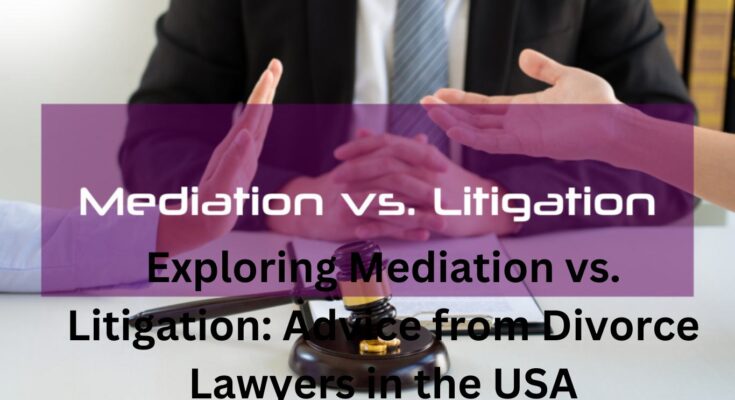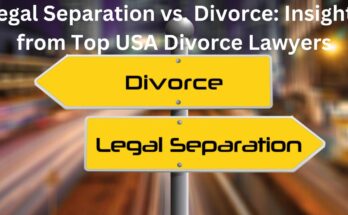Divorce is a challenging and emotional process, often made even more difficult by the method chosen to resolve disputes. In the USA, two primary paths exist for divorce resolution: mediation and litigation. While both have their pros and cons, the choice between them depends on several factors, including the complexity of the case, the emotional dynamics between spouses, and the desired outcome. Divorce lawyers in the USA are skilled in guiding clients through both paths, ensuring they make informed decisions that best suit their needs.
What Is Mediation?
Mediation is a voluntary process where both spouses meet with a neutral third party—called a mediator—to resolve issues related to their divorce. The mediator facilitates discussions and helps the couple negotiate an agreement that works for both parties. Unlike litigation, mediation is non-adversarial, meaning it focuses on cooperation rather than conflict.
Benefits of Mediation
- Cost-Effective: Mediation is generally less expensive than litigation due to lower legal fees and fewer court appearances.
- Faster Resolution: Mediation can be completed in a matter of weeks, while litigation can take months or even years.
- Confidentiality: Mediation is private, unlike court proceedings, which are public records.
- Greater Control: Couples have more control over the outcome since they work together to create a solution.
- Preserves Relationships: Mediation tends to preserve relationships, which is particularly important if children are involved.
Limitations of Mediation
- Not Always Suitable for High-Conflict Situations: If there’s a significant power imbalance, domestic violence, or one party is uncooperative, mediation may not be effective.
- No Guaranteed Outcome: The process relies on both parties agreeing to a settlement, so there’s no guarantee that issues will be resolved.
What Is Litigation?
Litigation involves taking the divorce case to court, where a judge will make decisions regarding division of assets, custody arrangements, and other important matters. It’s an adversarial process where each spouse hires a lawyer to represent their interests, and the judge has the final say.
Benefits of Litigation
- Binding Decision: A judge makes the final decision, which ensures a clear resolution of the case.
- Protection in High-Conflict Cases: For situations involving abuse or extreme conflict, litigation may be the safer option to ensure protection and fair treatment.
- Use of Discovery Tools: Lawyers in litigation can use legal tools such as subpoenas, depositions, and interrogatories to gather evidence, which can be useful in complex financial cases or when assets are hidden.
Limitations of Litigation
- High Costs: Litigation can be very expensive due to attorney fees, court costs, and expert witness fees.
- Time-Consuming: Divorce cases can drag on for months or even years, especially if either party appeals the decision.
- Public Proceedings: Court cases are public, meaning personal information about the divorce becomes part of the public record.
- Emotional Toll: The combative nature of litigation can escalate emotions, especially when children are involved.
Mediation vs. Litigation: Key Differences
| Aspect | Mediation | Litigation |
|---|---|---|
| Process | Informal, facilitated discussion | Formal, adversarial process in court |
| Cost | Lower overall cost | Higher due to attorney fees and court costs |
| Time | Typically quicker | Can take months or years |
| Control | More control for both spouses | Judge makes the final decision |
| Confidentiality | Private and confidential | Public record |
| Emotional Impact | Less stressful and confrontational | More stressful due to adversarial nature |
| Appropriateness | Best for cooperative couples | Suitable for high-conflict situations |
When to Choose Mediation
Mediation is a great option when both spouses are open to communication and negotiation. It’s especially useful when:
- The couple agrees on most issues and just needs help resolving a few.
- Both parties are motivated to maintain a civil relationship, particularly when children are involved.
- Financial matters are relatively straightforward, with little to no complexity.
- There is no history of abuse or coercion, and both spouses are on equal footing.
When to Choose Litigation
Litigation may be necessary when mediation is not an option or when one party is unwilling to cooperate. It’s best suited for cases where:
- There is a significant power imbalance or history of abuse.
- One spouse is hiding assets or there are complicated financial issues.
- Child custody is heavily contested, and the parents cannot reach a mutual agreement.
- One spouse is not participating in good faith or refuses to compromise.
Divorce Lawyers’ Advice: Mediation vs. Litigation
Divorce lawyers typically encourage mediation first because it promotes collaboration and preserves relationships. However, they also recognize that litigation might be necessary in certain situations. Here’s some expert advice from divorce lawyers across the USA:
1. Consider Your Long-Term Goals
Divorce is not just about ending a marriage but also about transitioning to a new phase of life. If both parties are willing to negotiate and compromise, mediation offers a more amicable solution that allows both individuals to maintain control over their futures.
2. Understand the Emotional Impact
High-conflict divorces can take an emotional toll on individuals, especially if children are involved. Mediation can help reduce the emotional strain by encouraging a more respectful environment. On the other hand, litigation can prolong the stress and strain relationships further.
3. Protect Your Legal Rights
In cases where one spouse is likely to be uncooperative, mediation may not be effective. In such situations, litigation might be the only viable path to ensure that your legal rights are fully protected. Divorce lawyers will carefully assess the situation and guide their clients accordingly.
Conclusion
Choosing between mediation and litigation depends on the unique circumstances of your divorce. While mediation can offer a more peaceful, efficient, and cost-effective resolution, litigation provides a clear path to resolving conflicts in more contentious situations. A skilled divorce lawyer will assess your case, advise you on the best approach, and guide you through the process to ensure your rights are protected.




